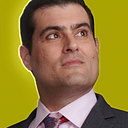ADAM RIESS: A NOBEL MIND ON A COSMIC QUEST!
Nobel Prize winner Adam Riess is my guest on this episode of INTO THE IMPOSSIBLE. He shares insights about the prize and what keeps him motivated now that he’s won science’s highest honor. We also discuss the most pressing topics facing the field of cosmology today.
Adam has an enviable ability to clearly communicate these complicated scientific concepts. I’m hopeful that my listeners and viewers who aren’t physicists will be able to follow along in our discussions of expansion, supernovae, and the Hubble constant. His science communication skills are in top form in this article in Symmetry magazine about the latter subject. It quotes both of us, but only Adam can think to equate predicting the age of the universe to a growing toddler.
I always enjoy hearing what sparked my guest’s love for science, it’s so often great teachers and school programs. Or their own parent’s wonder, whether they were scientists or not. Adam mentions both inspirations in this interview. And also points out that he and I live in fortuitous times to be cosmologists, the length of our careers has spanned incredible leaps in knowledge.
“If you show up in a class and they tell you ‘nobody knows these things,’” he says, referring to what we both heard early on, “Probably nobody will ever know those things…And you and I got to see a lot of those topple over the last twenty years…I feel lucky that we’ve been around during that time. We all as humans are fortunate to be around during the times when we’ve learned so many profound things that address people’s basic curiosity about the universe.”
Curiosity is a theme throughout my discussion with Adam. He points to it as his ethical will, what he hopes to pass on. And also credits his success as a scientist with remaining curious, saying he may not be the smartest person in the field but he is constantly working on a puzzle. Humble words from a man who was part of the discovery that’s been named the #1 greatest achievement using the Hubble telescope.
I’ve noticed in recent interviews that the professors that seem most content are those who tell me they never tried to adhere to the prescribed path, what I call the academic hunger games. Graduate school, postdoc, professorship, tenure, publish or perish, prizes, and so on.
“I did not feel compelled by that scheme,” says Adam. “Early on, I decided science was really interesting to me and I would pursue it as long as it was fun and engaging but that I wouldn’t pursue it for checking certain boxes along some path.”
Of course Adam and I did discuss the Nobel Prize. Like me, he believes it has its flaws. What would he change? Without hesitation, Adam says the size of the group that can be recognized. That only three people can share the prize is a controversy nearly every year. In today’s world, science is done in teams and as part of huge collaborations. And, as with Adam’s prize, sometimes discoveries are even shared by competing groups who came by their conclusions around the same time.
Adam acknowledges the role of teams throughout our conversation. Instead of talking about mentors, he credited good colleagues and top notch university facilities as he came up through the physics world. If every great discovery requires extraordinary evidence, as he says, then they also require those teams of people.
Adding Adam to the list of Nobel Prize winners on the INTO THE IMPOSSIBLE podcast is an honor. Though we are contemporaries, I consider him a role model. His relentless pursuit of topics of great meaning is inspirational. Hopefully his good habits and consistency will rub off on me and all my listeners during this episode.
Read Adam’s recent article in Scientific American, written with recent guest of the podcast Mario Livio.
Adam Riess talks about his latest paper on the podcast Cosmology Talks.
Watch an interview with Nobel Prize winner Duncan Haldane on episode 10 of INTO THE IMPOSSIBLE.
Listen to an interview with Nobel Prize winner Carl Wieman on episode 21 of INTO THE IMPOSSIBLE.
Listen to NPR’s Science Friday interview with Adam.
Find Riess on the web.
Find Brian Keating on Twitter @DrBrianKeating and YouTube
Please subscribe, rate, and review the INTO THE IMPOSSIBLE Podcast on iTunes: https://itunes.apple.com/us/podcast/into-the-impossible/id1169885840?mt=2
Adam Riess was a recipient of the 2011 Nobel Prize in Physics. He is a Professor of Physics at Johns Hopkins University and an Astronomer at the Space Telescope Science Institute. He has a PhD in Astrophysics from Harvard University.
